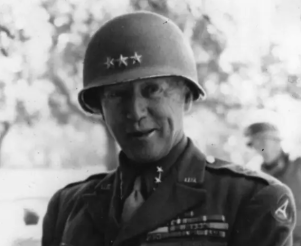
Born November 11, 1885, in San Gabriel, California, as a young boy, George Patton set his sights on becoming a war hero. During his childhood, he heard countless stories of his ancestors’ victories in the American Revolution and Civil War. Striving to follow in their footsteps, he enrolled in Virginia Military Institute in 1904. A year later, he attended the U.S. Military Academy at West Point, graduating on June 11, 1909. In 1910 he married Beatrice Ayer, a childhood friend. In 1912 Patton competed in the Pentathlon at the Stockholm Olympics. He did well in the fencing portion and placed fifth overall. In 1913 he was ordered to the post of Master of the Sword at the Mounted Service School in Kansas, where he taught swordsmanship while also attending as a student. Despite his grace with a sword, Patton had a reputation for being an accident prone young man. Some even speculate that his explosive temper and incessant cursing were the result of a skull injury in his 20s.
Patton had his first real taste of battle in 1915, when leading cavalry patrols against Pancho Villa at Fort Bliss along the Mexican border. In 1916 he was selected to aide John J. Pershing, commander of the American Expeditionary Forces in Mexico. In Mexico, Patton impressed Pershing by personally shooting Mexican leader Julio Cardenas during the Battle of Columbus. Pershing promoted Patton to captain and invited him to lead Pershing’s Headquarters Troop once they left Mexico.
In 1917, during WWI, Patton was the first officer assigned to the new American Expeditionary Force tank corps. Tanks had proven effective in France at the Battle of Cambrai. Patton studied this battle and established himself as one of the leading experts in tank warfare. He organized the American tank school in Bourg, France, and trained American tankers to pilot the French Renault tanks. Patton’s first battle was at St. Mihiel, in September 1918. He was later wounded in the battle of Meuse-Argonne and later earned the Distinguished Service Medal for his leadership of the tank brigade and establishing the tank school.
In 1945, Patton and his army managed to cross the Rhine and charge straight into the heart of Germany, capturing 10,000 square miles of enemy territory along the course of the 10-day march, and liberating Germany from the Nazi’s in the process.
In 1970 the film Patton explored Patton’s complex character, which ran the gamut from seemingly ruthless to surprisingly sentimental. The film garnered seven Academy Awards. To this day, Patton is considered one of the most successful field commanders in U.S history.
We honor you, George Patton.
